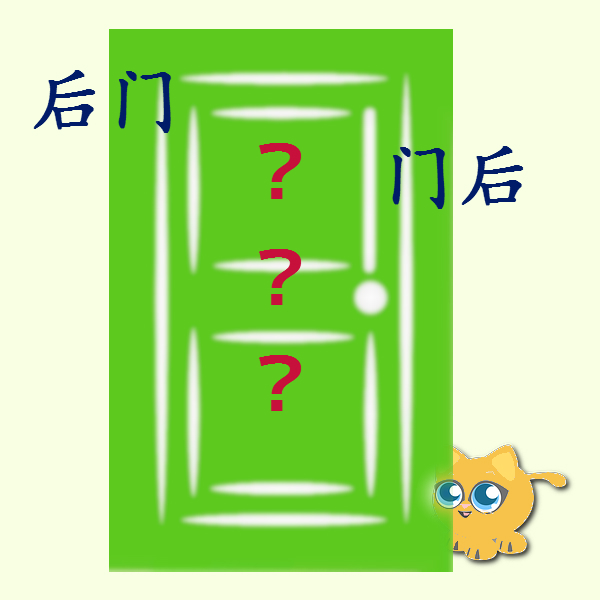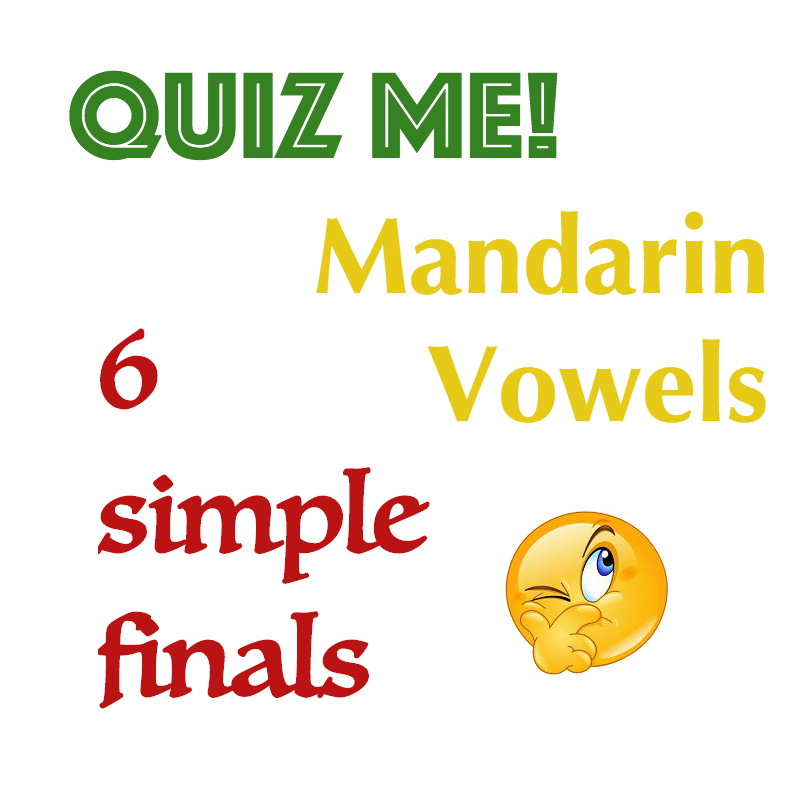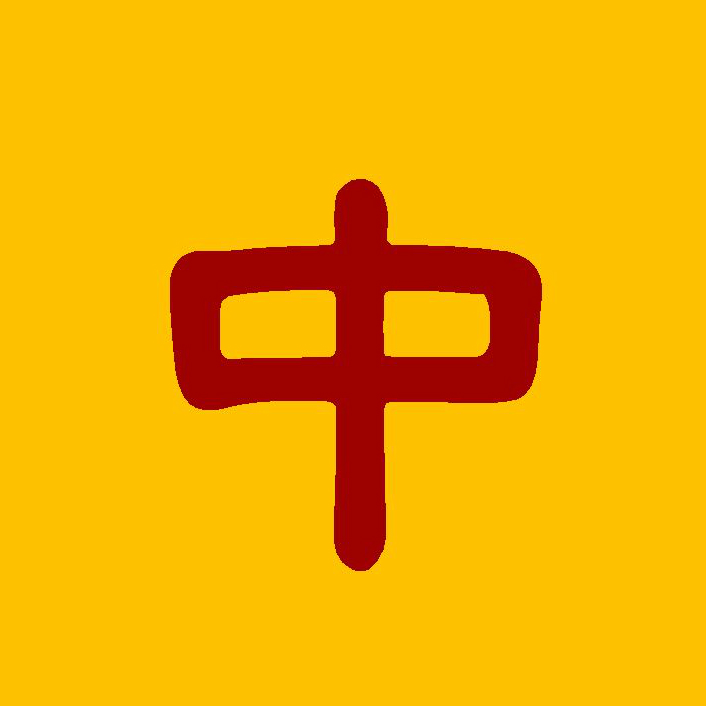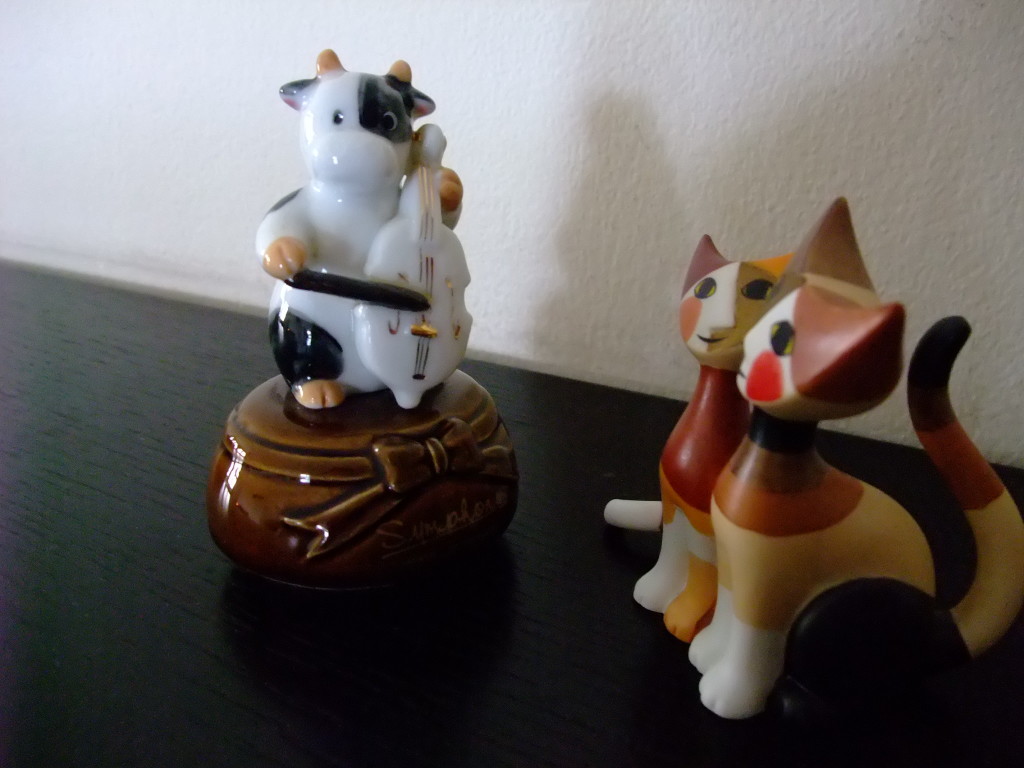Quiz – 再 zài, 又 yòu and 还 hái
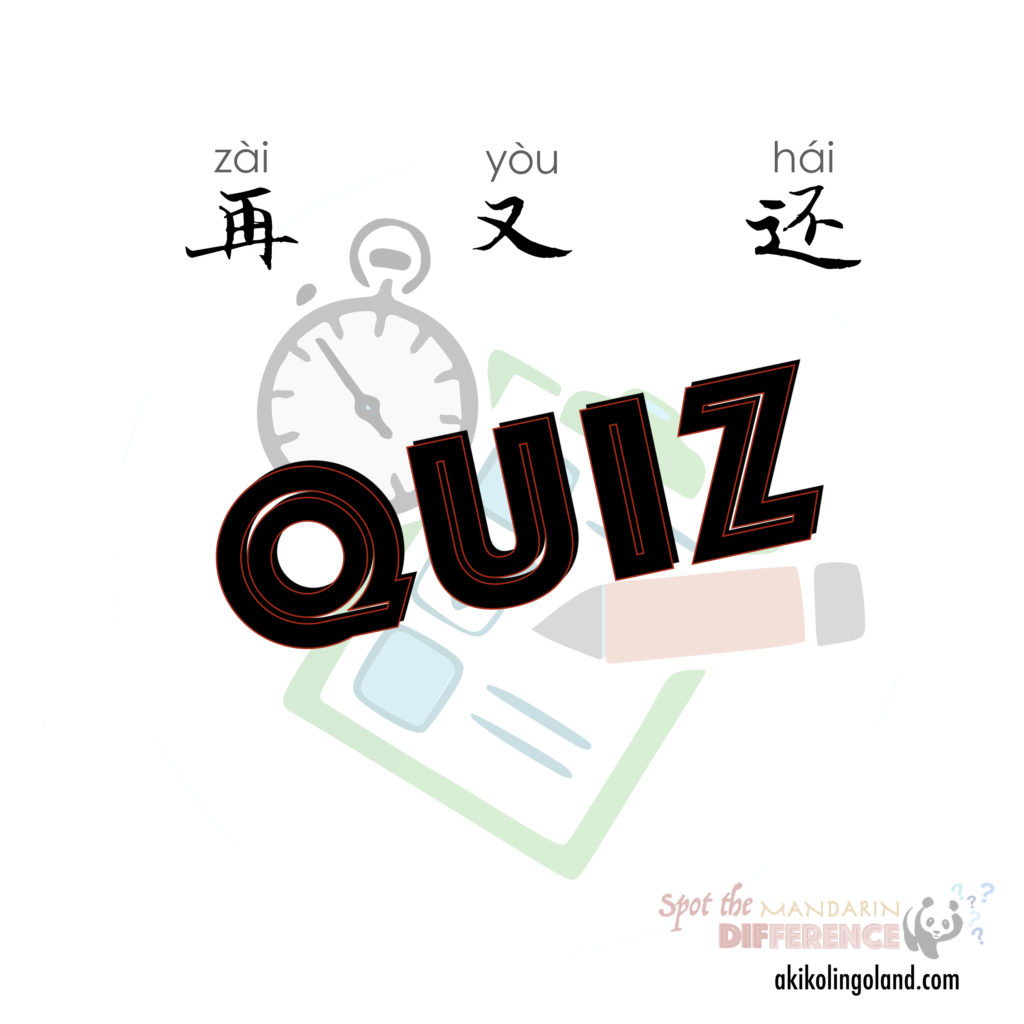
How confident are you in using 再 zài, 又 yòu and 还 hái? Find out how well you know them through the test below. If you are unsure, check out the explanation here first. (Answer key at bottom of page.)
A)
Determine if the correct adverb is used in each of the sentences below. Correct them if they are wrong. (Give yourself time to think what each sentence means before checking the translation.)
1)
Qǐng hái shuō yī biàn.
请还说一遍。
2)
Wǒ míng tiān yòu lái.
我明天又来。
3)
Zhè me wǎn le, nǐ zài bù huí jiā?
这么晚了,你再不回家?
4)
Tā mà wǒ, hái dǎ wǒ.
他骂我,还打我。
5)
Wǒmen jīntiān zài qù nàr chī fàn le.
我们今天再去那儿吃饭了。
6)
Zhè bù diànyǐng dōu kànguo liǎng biàn le, hái kàn?
这部电影都看过两遍了,还看?
7)
Nǐ yǐjing hē le sān bēi kāfēi le, bié hái hē le, bùrán jīnwǎn hái yào shīmián le.
你已经喝了三杯咖啡了,别还喝了,不然今晚还失眠了。
8)
Gāngcái de jùhuì shang, wǒ jiàn dào Xiǎo Lǐ, hái jiàn dào Xiǎo Zhāng.
刚才的聚会上,我见到小李,还见到小张。
B)
Fill in the correct adverb. There may be more than one correct answer. (Give yourself time to think what each sentence means before checking the translation.)
1)
Huānyíng ( ) lái
欢迎( )来。
2)
Wǒ míngtiān ( ) gěi nǐ zuò jiǎozi.
我明天( )给你做饺子。
3)
Jīntiān méi xīnqíng kàn kǒngbùpiān, zhè bù diànyǐng wǒmen xià cì ( ) kàn ba.
今天没心情看恐怖片,这部电影我们下次( )看吧。
4)
Tā děi shàng bān, ( ) děi zhàogù háizi, tài xīnkǔ le
她得上班,( )得照顾孩子,太辛苦了。
5)
Wǒ yǐjing chī le yī wǎn le, ( ) xiǎng ( ) chī yī wǎn.
我已经吃了一碗了,( )想( )吃一碗。
6)
Nǐ yǐhòu bié ( ) chídào le.
你以后别( )迟到了。
7)
Wǒmen dōu kuài chīwán le, nǐ zěnme ( ) méi dào?
我们的都快吃完了,你怎么( )没到?
8)
姐姐(A)和妹妹(B)的对话
Dialogue between elder sister (A) and younger sister (B)
A:
Wǒ kuài yào xià bān le, nǐ děng wǒ, wǒmen yīqǐ chī fàn. Yàoshi nǐ dùzi è, xiān chī ge píngguǒ.
我快要下班了,你等我,我们一起吃饭。要是你肚子饿,先吃个苹果。
B:
Chī le píngguǒ, yàoshi ( a ) è ne?
吃了苹果,要是( a )饿呢?
A:
Yàoshi ( b ) è, ( c ) chī gēn xiāngjiāo.
要是( b )饿,( c )吃根香蕉。
B:
Chī le xiāngjiāo, yàoshi ( d ) è ne?
吃了香蕉,要是( d )饿呢?
A:
Nà wǒ mǎshang xià bān gēn nǐ qù chī fàn.
那我马上下班跟你去吃饭。
Chīwán fàn
吃完饭……
A:
Chībǎo le ma? ( e ) è ma?
吃饱了吗?( e )饿吗?
B:
Bù è le, bǎo le.
不饿了,饱了。
Liǎng xiǎoshí hòu
两小时后……
B:
Wǒ ( f ) è le, ( g ) néng ( h ) chī le.
我( f )饿了,( g )能( h )吃了。
Answers
A)
1)
Qǐng hái shuō yī biàn.
请还说一遍。✗(再 zài)
2)
Wǒ míng tiān yòu lái.
我明天又来。✗(再 zài/还 hái)
3)
Zhè me wǎn le, nǐ zài bù huí jiā?
这么晚了,你再不回家?✗(还 hái)
4)
Tā mà wǒ, hái dǎ wǒ.
他骂我,还打我。✓
5)
Wǒmen jīntiān zài qù nàr chī fàn le.
我们今天再去那儿吃饭了。✗(又 yòu)
6)
Zhè bù diànyǐng dōu kànguo liǎng biàn le, hái kàn?
这部电影都看过两遍了,还看?✓
7)
Nǐ yǐjing hē le sān bēi kāfēi le, bié hái hē le, bùrán jīnwǎn hái yào shīmián le.
你已经喝了三杯咖啡了,别还喝了,不然今晚还失眠了。✗(再 zài、又 yòu)
8)
Gāngcái de jùhuì shang, wǒ jiàn dào Xiǎo Lǐ, hái jiàn dào Xiǎo Zhāng.
刚才的聚会上,我见到小李,还见到小张。✓
B)
1)
Huānyíng (zài) lái
欢迎(再)来。
2)
Wǒ míngtiān (zài/hái) gěi nǐ zuò jiǎozi.
我明天(再/还)给你做饺子。
3)
Jīntiān méi xīnqíng kàn kǒngbùpiān, zhè bù diànyǐng wǒmen xià cì (zài) kàn ba.
今天没心情看恐怖片,这部电影我们下次(再)看吧。
4)
Tā děi shàng bān, (yòu/hái) děi zhàogù háizi, tài xīnkǔ le
她得上班,(又/还)得照顾孩子,太辛苦了。
5)
Wǒ yǐjing chī le yī wǎn le, (hái) xiǎng (zài) chī yī wǎn.
我已经吃了一碗了,(还)想(再)吃一碗。
6)
Nǐ yǐhòu bié (zài) chídào le.
你以后别(再)迟到了。
7)
Wǒmen dōu kuài chīwán le, nǐ zěnme (hái) méi dào?
我们的都快吃完了,你怎么(还)没到?
8)
A:
Wǒ kuài yào xià bān le, nǐ děng wǒ, wǒmen yīqǐ chī fàn. Yàoshi nǐ dùzi è, xiān chī ge píngguǒ.
我快要下班了,你等我,我们一起吃饭。要是你肚子饿,先吃个苹果。
B:
Chī le píngguǒ, yàoshi (a hái) è ne?
吃了苹果,要是(a 还)饿呢?
A:
Yàoshi (b hái) è, (c zài) chī gēn xiāngjiāo.
要是(b 还)饿,(c 再)吃根香蕉。
B:
Chī le xiāngjiāo, yàoshi (d hái) è ne?
吃了香蕉,要是(d 还)饿呢?
A:
Nà wǒ mǎshang xià bān gēn nǐ qù chī fàn.
那我马上下班跟你去吃饭。
Chīwán fàn
吃完饭……
A:
Chī bǎo le ma? (e hái) è ma?
吃饱了吗?(e 还)饿吗?
B:
Bù è le, bǎo le.
不饿了,饱了。
Liǎng xiǎoshí hòu
两小时后……
B:
Wǒ (f yòu) è le, (g yòu) néng (h zài) chī le.
我(f 又)饿了,(g 又)能(h 再)吃了。
If you’ve enjoyed this, don’t forget to share, and do join me on Facebook, YouTube, Twitter, Pinterest!







